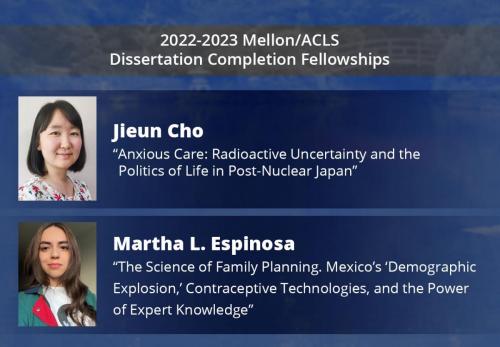
Ph.D. Candidates Cho, Espinosa Receive 2022 Mellon/ACLS Dissertation Completion Fellowships

Duke Ph.D. candidates Jieun Cho (Cultural Anthropology) and Martha L. Espinosa (History) have received the Mellon/American Council of Learned Societies Dissertation Completion Fellowship for the 2022-2023 academic year.
The ACLS awarded 50 fellowships from a pool of more than 800 applicants. The prestigious award, funded by The Andrew W. Mellon Foundation, provides a $35,000 stipend and up to $8,000 in research funds and university fees to exceptional graduate students in their final year of dissertation writing. Fellows will also participate in a professional development workshop to help prepare them for postdoctoral career opportunities within and beyond the academy.
Here’s a look at this year’s Duke recipients:

Jieun Cho
Cultural Anthropology
Dissertation: “Anxious Care: Radioactive Uncertainty and the Politics of Life in Post-Nuclear Japan”
This project investigates what conceptions of “life” are re/produced in a risky environment after the 2011 Fukushima meltdown in Japan. Despite the striking visibility of “Fukushima children” as the signature victims of the disaster in risk politics, there is little research on actual families who are raising children amidst post-Fukushima radiation. By studying the strivings of families who seek to raise healthy children in differentially exposed towns of Fukushima, this project examines how livability is created despite and through radioactive uncertainty. What constitutes “life” when it continues amidst chronic exposure to radiation? How can such life be made livable and in what sense? What are the implications of new forms of care and relations around a child imperiled by radiation? Exploring these questions ethnographically, this project argues that notions of life are undergoing a moment of reconfiguration in post-nuclear Japan both by real-life families and the family form.

Martha L. Espinosa
History
Dissertation: “The Science of Family Planning. Mexico’s ‘Demographic Explosion,’ Contraceptive Technologies, and the Power of Expert Knowledge”
This project studies the joint efforts of Mexican doctors, chemists, and demographers who tried to curb Mexico’s “demographic explosion” in the mid-20th century. These experts formed alliances with international foundations and pharmaceutical companies to produce knowledge about the consequences of population growth and develop contraceptives in Mexico between 1950-1970, a period in which the government maintained a pronatalist and antiimperialist stance. This research demonstrates that such Mexican experts dodged the opposition of the government and the Catholic Church to family planning, and they became key actors in testing the birth control pill with local women, a forgotten episode in the history of contraceptive technologies.